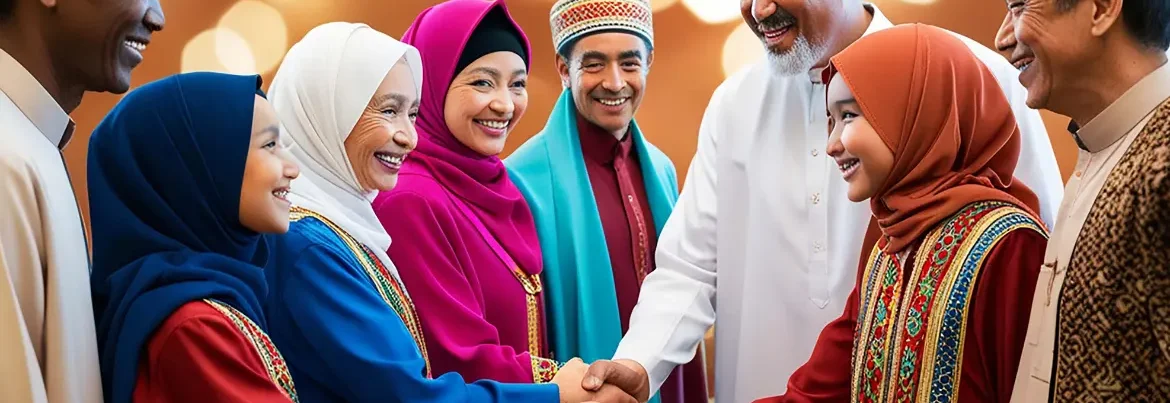
10 Islamic Etiquettes Every Muslim Should Follow
Islam is not only a religion of belief but also a complete way of life. It teaches us how to worship Allah, how to treat others, and even how to carry ourselves in daily life. Following Islamic etiquettes strengthens our faith, improves our character, and brings blessings in both this world and the Hereafter.
The Prophet Muhammad (peace be upon him) said:
“The best among you are those who have the best manners and character.” (Sahih Bukhari)
In this article, we will go through 10 Islamic etiquettes every Muslim should follow, explain their importance and how they can be practiced in daily life.
1. Greeting Others with Salaam
The Islamic greeting, As-Salamu Alaikum (“Peace be upon you”), is more than just a phrase. It is a dua (supplication) for peace, mercy, and blessings upon another person.
The Prophet Muhammad (peace be upon him) encouraged Muslims to spread salaam widely. He said:
“You will not enter Paradise until you believe, and you will not believe until you love one another. Shall I not tell you something which, if you do it, you will love one another? Spread salaam among yourselves.” (Sahih Muslim)
-
Why it’s important: Spreading salaam creates love, unity, and peace in society. It removes arrogance and builds brotherhood.
-
How to practice: Always greet fellow Muslims with As-Salamu Alaikum whether you know them or not. Respond with Wa Alaikum Assalam wa Rahmatullahi wa Barakatuh.
2. Respecting Parents
In Islam, parents hold a very high status. Allah commands in the Quran:
“And We have enjoined upon man [care] for his parents. His mother carried him, [increasing her] in weakness upon weakness, and his weaning is in two years. Be grateful to Me and to your parents; to Me is the [final] destination.” (Quran 31:14)
-
Why it’s important: Serving parents is one of the greatest forms of worship. After worshipping Allah, kindness to parents is the next most important duty.
-
How to practice: Speak to them respectfully, obey them in all matters except sin, make dua for them, and care for them in their old age.
3. Speaking with Kindness
The tongue is one of the greatest blessings Allah has given us, but it can also cause harm if misused. Islam emphasizes speaking good words or remaining silent.
The Prophet (peace be upon him) said:
“Whoever believes in Allah and the Last Day, let him speak good or remain silent.” (Sahih Bukhari and Muslim)
-
Why it’s important: Words can heal or hurt. Kind speech brings people closer, while harsh words create hatred.
-
How to practice: Avoid gossip, backbiting, lies, and hurtful speech. Instead, use words of encouragement, wisdom, and truth.
4. Being Honest and Trustworthy
Honesty is a foundation of faith. The Prophet Muhammad (peace be upon him) was known as Al-Amin (the trustworthy) even before he became a Prophet.
Allah says:
“Indeed, Allah commands you to render trusts to whom they are due and when you judge between people to judge with justice…” (Quran 4:58)
-
Why it’s important: Honesty builds trust in relationships and society. A dishonest person may gain short-term benefits, but in the long run, they lose the trust of others and displease Allah.
-
How to practice: Always keep promises, return what is entrusted, and avoid cheating in business or personal dealings.
5. Observing Modesty (Haya)
Modesty is a hallmark of a true believer. The Prophet (peace be upon him) said:
“Every religion has its characteristic, and the characteristic of Islam is modesty.” (Ibn Majah)
-
Why it’s important: Modesty protects us from sins, keeps our hearts pure, and maintains dignity.
-
How to practice: Lower the gaze, dress modestly according to Islamic guidelines, avoid unnecessary interaction with the opposite gender, and maintain humility in behavior.
6. Seeking Knowledge
In Islam, seeking knowledge is a form of worship. The first revelation to the Prophet (peace be upon him) was “Read!” (Quran 96:1). Knowledge is what guides us to Allah and helps us understand His commands.
The Prophet (peace be upon him) said:
“Whoever takes a path upon which to obtain knowledge, Allah makes the path to Paradise easy for him.” (Sunan Abu Dawood)
-
Why it’s important: Without knowledge, one cannot practice Islam correctly. Knowledge saves us from ignorance and misguidance.
-
How to practice: Study the Quran, Hadith, and authentic Islamic books. Attend classes and seek guidance from qualified teachers.
At our Quran Academy, we provide one-on-one online Quran tutoring for children and adults. Our qualified tutors help students learn Quran reading, Tajweed, memorization, and Islamic studies in a flexible and interactive way. By seeking knowledge, you are fulfilling a great act of worship, and our platform is here to make this journey easy and effective.
7. Practicing Patience (Sabr)
Life is filled with tests – some bring joy, while others bring hardship. Islam teaches us to remain patient in all situations.
Allah says:
“Indeed, Allah is with the patient.” (Quran 2:153)
-
Why it’s important: Patience helps us stay strong in times of trial and prevents us from falling into despair or anger. It is also a key to success in both worldly life and the Hereafter.
-
How to practice: Control anger, avoid complaints during hardship, and trust that Allah’s plan is always best.
8. Showing Gratitude
Gratitude (Shukr) is an important etiquette that keeps our hearts connected to Allah.
Allah says:
“If you are grateful, I will surely increase you [in favor]; but if you deny, indeed, My punishment is severe.” (Quran 14:7)
-
Why it’s important: Gratitude increases blessings and brings contentment. A grateful person is loved by Allah and respected by people.
-
How to practice: Say Alhamdulillah in every situation, appreciate the blessings you have, and use them in ways that please Allah.
9. Caring for Neighbors and Community
Islam emphasizes building strong communities. The Prophet (peace be upon him) said:
“He is not a believer whose stomach is filled while the neighbor to his side goes hungry.” (Sunan al-Kubra)
-
Why it’s important: Caring for neighbors and community members strengthens bonds, spreads compassion, and creates harmony.
-
How to practice: Share food, check on their well-being, offer help in times of need, and avoid causing harm or disturbance.
10. Maintaining Cleanliness
Cleanliness is a sign of faith. The Prophet (peace be upon him) said:
“Cleanliness is half of faith.” (Sahih Muslim)
-
Why it’s important: Cleanliness keeps the body and soul pure, prevents diseases, and makes one presentable before Allah and others.
-
How to practice: Perform regular wudu, keep clothes and body clean, maintain cleanliness at home and in public spaces, and ensure purity in both physical and spiritual aspects.
Conclusion
Islamic etiquettes are not just manners – they are acts of worship that bring us closer to Allah and improve society as a whole. By following these 10 important etiquettes – greeting with salaam, respecting parents, speaking kindly, being honest, practicing modesty, seeking knowledge, showing patience, being grateful, caring for neighbors, and maintaining cleanliness – we can live as true representatives of Islam.
At LearnReadQuran, we believe that learning the Quran and Islamic teachings is the key to practicing these Islamic etiquettes. Our online Quran tutors guide students not only in Quran recitation and Tajweed but also in understanding the Islamic way of life. By learning and applying these etiquettes, we can achieve success in this world and eternal reward in the Hereafter.

